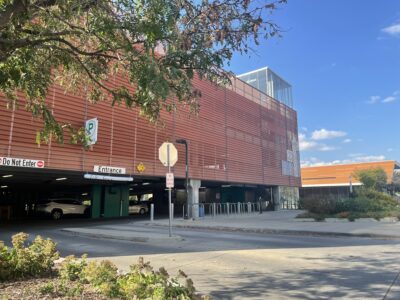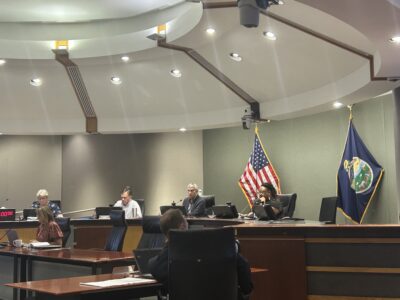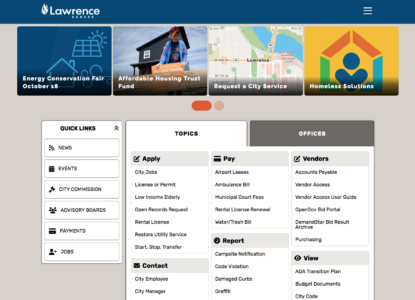City seeking more than money from Oread group as deadline nears

The Oread Hotel, 1200 Oread Ave.
Oread Inn LC has to do more than pay back almost $500,000 by Thursday in order to avoid risking termination of its redevelopment agreement with the city — an agreement that has generated more than $3 million for the development group over the past seven years and has the potential to bring it $8 million more.
According to a demand letter sent from the city Dec. 16 and shared with the Journal-World on Tuesday, developers have been told to agree, in writing, to include a clause in their arrangement with the city that would allow the city to audit any sales tax records of Oread Inn, its tenants or anyone doing business with The Oread hotel without advance notice.
The written agreement to include the audit clause, as well as $492,914.86, is due to the city Thursday, the letter states.
Interim City Manager Diane Stoddard said Oread Inn had not responded as of Wednesday afternoon.
She said the deadline was firm.
In the redevelopment agreement between the city and Oread Inn is a clause that calls for mutual assistance. The clause says that the city and developer agree to assist each other and take actions necessary to carry out the intent of the agreement.
The city’s letter states that its current demands on Oread Inn were made under that clause. If Oread Inn were to not follow through, the development group may be deemed as in default, potentially giving cause for the agreement to be terminated.
Findings
The city’s demands were sent after Wichita-based auditing firm Allen, Gibbs & Houlik said they found the hotel’s development group filed incorrect sales tax returns in order to receive higher sales tax rebates from the city and county.
The group was receiving the rebates through a redevelopment agreement, approved by the City Commission in 2008, which created a special taxing district at 1200 Oread Ave. The special taxing district allows Oread Inn to receive a rebate on a large percentage of all local sales taxes collected at that address. The agreement put an $11 million cap on the rebates.
The hotel is also part of a transportation development district, allowing businesses there to charge an extra 1 percent sales tax.
The city-ordered audit focused on Oread Wholesale LC, a business listed by the state as having a registered office at 1200 Oread Ave. Oread Wholesale is owned by Lawrence businessman Thomas Fritzel, a leader of the group that developed The Oread hotel.
According to the auditors’ report, Oread Wholesale reported sales within the special taxing district but actually made none.
Oread Wholesale’s inaccurate sales tax reports led the city to over-reimburse Oread Inn by $429,914.85, the report states. That amount, along with $63,320.11 in interest, is what the city ordered the developers to pay by the end of Thursday.
The city’s demand letter described Oread Wholesale’s behavior as “obfuscatory and recalcitrant.”
Auditors said in their report that the circumstance “strongly suggests” Oread Wholesale was created and used to intentionally manufacture sales within the special taxing district in order to bump up the amount that would be reimbursed back to Oread Inn.
Sales taxes reported from Oread Wholesale made up more than one-third of the total amount reimbursed by the city, according to a city fact sheet about the audit.
The city is requiring changes be made to the redevelopment agreement in order to “foreclose the possibility of a similar occurrence in the future,” the letter states.
More demands
Besides the almost $500,000 repayment and the addition of an audit clause to the agreement, the city is ordering developers to pay for the city’s cost of hiring an auditing firm, which, as of Dec. 5, was $27,455.65. The city is also requiring developers to give written assurance that they will “fully cooperate” with the city in any future audits.
Lastly, the city wants Oread Inn to get Oread Wholesale’s tax records and documents that the business used to prepare its original sales tax returns and provide them to Allen, Gibbs & Houlik by Jan. 18.
Oread Wholesale filed forms with the state to amend some of its sales tax returns after the city contacted the business about the audit, the report states. The changes reduced net sales within the special tax district by nearly 62 percent.
Auditors, in their report, cited trouble early on in reviewing Oread Wholesale’s books and records, but they were later given access to copies of documents the business used to prepare its monthly sales tax returns from January 2012 through June 2015.
Auditors were told that earlier documents were destroyed and that it was the business’ practice to do so because of a Kansas Department of Revenue policy that requires businesses to retain only three years’ worth of records.
The findings were thought by the auditing firm to violate Kansas law. But Freda Warfield, executive office administrator for Revenue Secretary Nick Jordan, said via email, “this is a local issue” because it stems from the special taxing district established by the city.
Stoddard said Tuesday the city has had preliminary discussions with law enforcement, but that she couldn’t comment further because it is against city practice to comment on criminal investigations.







